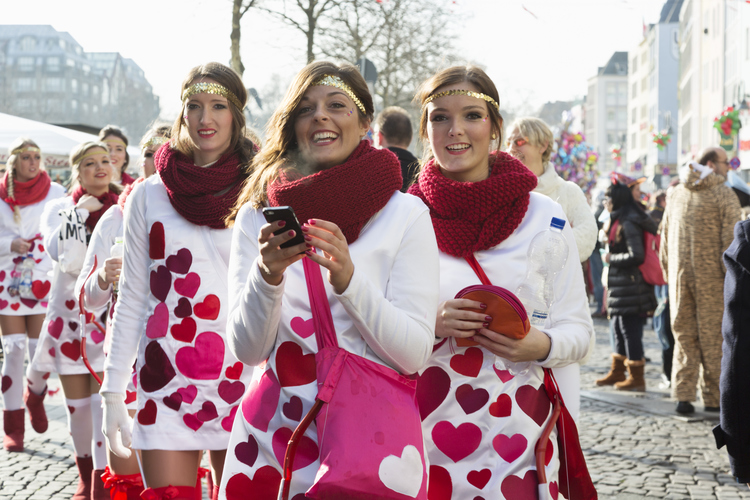
Do You Get a Black Moon?
What is a Black Moon, and why does it happen in December?
Shrove Tuesday is the last day before the fasting period of Lent (for Western Christians), 47 days before Easter Sunday. Shrove Tuesday is also called Mardi Gras, Fat Tuesday, or Pancake Day.
Carnival Tuesday is not a public holiday. Businesses have normal opening hours.

A group of young women celebrating carnival in Cologne, Germany.
© iStockphoto.com/SilviaJansen
Shrove Tuesday is the last day before the fasting period of Lent in Western Christian churches. On Shrove Monday and Shrove Tuesday, people in many countries celebrate Carnival, bake pancakes, and prepare themselves for 40 days of fasting before the most important festival in the Christian Church: Easter.
The word shrove means being absolved from sin through confession and penance.
Shrove comes from the Latin word for “writing” (scribere); the English Church used the word for writing down rules (scrifan) to mean “absolving sinners” (shrive).
Shrove Tuesday is the time for Christians to prepare for absolution by confessing to their priest and by fasting or renouncing comforts for the 40 days of Lent, starting on Ash Wednesday.
Carnival is the name for pre-Lenten festivities in many countries, including Germany. The celebrations start on the Thursday before Ash Wednesday, a day called Altweiber (Old Women’s Day). The big Carnival parades are held on Shrove Monday (Rosenmontag) and Shrove Tuesday (Faschingsdienstag). In Germany, Carnival ends before Ash Wednesday starts, usually at midnight.
Depending on the region, Germans use different words for the same celebration. In the West, along the Rhine river and most prominently in Cologne, festivities are called Karneval. In Bavaria and East Germany, the word Fasching is mainly used, while South Germans and Swiss Germans call it Fastnacht.
The mainstay of Carnival in Germany is probably Cologne with its colorful parades and traditional costumes depicting 18th and 19th-century uniforms. When Napoleon and his army had to retreat from the Rhine river in 1813, they left behind many colorful French uniforms; the people of Cologne promptly used them to mock the invaders by dressing up as soldiers for Karneval.
Other important Carnival parades can be found in Mainz (Mainzer Fasnacht) and in Basel in Switzerland. Every big city in Germany has its own traditions and customs. In Basel and Southern Germany, people wear wooden masks, many of them hundreds of years old, depicting horrible faces of demons and witches. This goes back to the ritual of “cleansing” the world of the dark days of winter before welcoming spring.
The word Carnival is said to come from the simplified Latin “carne levare” or “carne vale” (goodbye, meat!). The days of Carnival were traditionally for eating meat before putting it away for the fasting season. Carnival was also the last time for “pleasures of the flesh,” such as dancing, drinking, and other connected activities, before the time of Lent.
Another possible origin for the word carnival is the Latin word “carrus navalis,” a colorful wooden boat people carried through the streets during an old spring celebration. These boats, or “parade floats,” as they are called today, still are an essential part of Carnival celebrations.
| Year | Weekday | Date | Name | Holiday Type |
|---|---|---|---|---|
| 2019 | Tue | Mar 5 | Carnival Tuesday | Observance |
| 2020 | Tue | Feb 25 | Carnival Tuesday | Observance |
| 2021 | Tue | Feb 16 | Carnival Tuesday | Observance |
| 2022 | Tue | Mar 1 | Carnival Tuesday | Observance |
| 2023 | Tue | Feb 21 | Carnival Tuesday | Observance |
| 2024 | Tue | Feb 13 | Carnival Tuesday | Observance |
| 2025 | Tue | Mar 4 | Carnival Tuesday | Observance |
| 2026 | Tue | Feb 17 | Carnival Tuesday | Observance |
| 2027 | Tue | Feb 9 | Carnival Tuesday | Observance |
| 2028 | Tue | Feb 29 | Carnival Tuesday | Observance |
| 2029 | Tue | Feb 13 | Carnival Tuesday | Observance |
While we diligently research and update our holiday dates, some of the information in the table above may be preliminary. If you find an error, please let us know.

What is a Black Moon, and why does it happen in December?

When will the next comet be visible?

Why do mornings keep getting darker after the December solstice?

The Second Day of Christmas is a public holiday in Germany. It always falls on December 26.